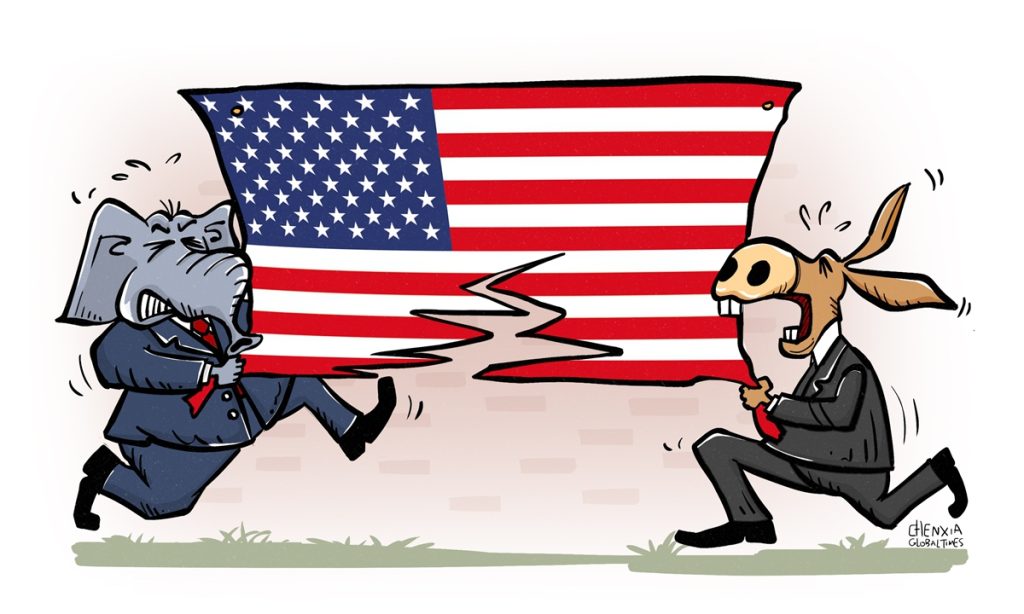US partisan politics: two ICU patients arguing over who should lead the country

"Who is McCarthy?" The New York Times quoted an American on Friday as proving US grassroots are so disconnected from politics. Why? The answer is in the headline - "How Do Americans Feel About Politics? Disgust Isn't a Strong Enough Word."
The article said "griping about politics is a time-honored American pastime but lately the country's political mood has plunged to some of the worst levels on record," thanks to the recent government shutdown crisis, chaotic Congress and the removal of House Speaker Kevin McCarthy. Many American voters interviewed said "they viewed the whole episode as evidence of broad dysfunction in Washington, and blamed political leaders for being consumed by workplace drama at the expense of the people they are meant to serve."
It also quoted a survey conducted by the Pew Research Center in July, which pointed out that only 16 percent of American adults said they trusted the federal government, close to the lowest levels in seven decades of polling.
If "disgust" isn't a strong enough word, which word would be strong enough? A more accurate adjective is hard to find to describe Americans' state of mind. It seems to be a complex emotion composed of tiredness, anger and despair.
When Americans look at their own system, it feels as if they are watching two patients in an ICU arguing over who should lead the country, and what's worse is that they have no other options, Lü Xiang, a research fellow at the Chinese Academy of Social Sciences, told the Global Times.
Since Joe Biden took office, political polarization and division in the US have not decreased, but intensified. The long-standing struggle between the Democratic and Republican parties for their own self-interest is nothing new. And now, the internal divisions within each party have become increasingly apparent, leading to a more complicated US political atmosphere.
US politicians have long caught impeachment fever. Former president Donald Trump's presidency has been an unusually busy season for impeachments. Efforts to impeach Joe Biden are also underway. McCarthy's impeachment, however, happened suddenly and unexpectedly. He was expelled from his role by a right-wing revolt in his own party over his compromise with Democrats to avert a government shutdown.
This shows that for some Republican hardliners, embracing a bipartisan deal is not tolerable, even if a deal could guarantee there would be no US government shutdown. The rules of the game are changing. Politics is no longer the art of compromise for the greater good in the US system.
The two US political parties have long been divided from within. The Democratic Party, because of the potential threat they feel from Trump, still maintains unity and harmony on the fa?ade. The Republican Party, on the other hand, has not been so rational, as mirrored in the latest episode. Next, the House needs to elect a new speaker, but the process will turn out to be extremely difficult, Lü said.
Having witnessed too many farces, the American people naturally develop fatigue toward the political infightings. And some start to realize the American democratic system is manipulated by a handful of elites with money, and common American people have no say in the politics, Xu Liang, an associate professor at the School of International Relations of Beijing International Studies University, told the Global Times.
The biggest problem in American politics lies with the elites. Political elites and the general public are from distinct planets — one from Mars and the other from Venus. Political elites rarely consider how to take care of their people, addressing people's concerns over livelihood, education and the economy. On the contrary, they focus on how to consolidate their political positions through creating opposition, confrontation and division.
The New York Times writes that the Biden administration has made great efforts to combat climate change, among other things, "yet those accomplishments have not fully registered with voters." Why? Because each party tends to focus on their own traditional advantageous fields and policy positions, rather than the common interests of all Americans. Take climate change. Even if the Democratic Party yearns for a good score, the Republican Party has from time to time emphasized that climate change is a "hoax." It is difficult to guarantee whether the next administration will dismantle the achievement made by the current government. Ultimately, the US' own development of new energy technologies will be crippled and the response of the US and the world to climate change will be hampered.
The two parties cannot even agree on the most basic issues, imagine how they can make any difference on major issues, Lü said. Lü also underlined when the Biden administration talks about economic data or boasts about its policies on some programs, they are running out of money, and borrowing money from the distant future to create some seemingly acceptable numbers. This is obscurantism, a way of deceiving people. But they cannot hide US political dysfunction forever. An economic crisis in the US will break out sooner or later, possibly in 2024, the expert warned.
And what would the American people do? Apart from feeling tired, disappointed and hopeless, the public could choose to avoid talking about politics, pretend they are disconnected from politics, or one day express their disgust by voting out the current leaders. Unfortunately, even by then, there is still no guarantee that the next leaders will genuinely take their interests into careful consideration.
Forget about "of the people, by the people, for the people." The current US system is one where the government is detached from the people. It presents to observers from other countries a superpower that continues to emit a decaying odor, corroding its own development vitality, disappointing its people, and causing astonishment and unease in the international community. How could such a system possibly be sustainable?